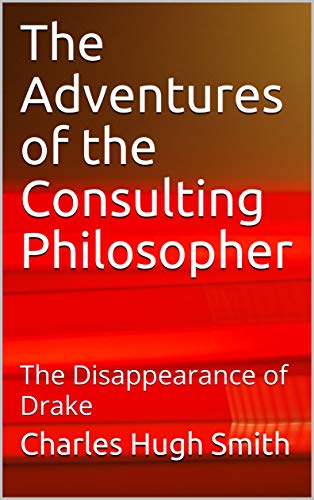Summary:
A productive national Strategy would systemically decentralize power and capital rather than concentrate both in the hands of a self-serving elite. If you ask America’s well-paid punditry to define America’s National Strategy, you’ll most likely get the UNESCO version: America’s national strategy is to support a Liberal Global Order (LGO) of global cooperation on the environment, trade, etc. and the encouragement of democracy, a liberal order that benefits all by providing global security and avenues for cooperation. This sounds good, but it overlooks the Endless Wars ™ and global meddling that characterize America’s realpolitik dependence on force, which it applies with a ruthlessness born of America’s peculiar
Topics:
Charles Hugh Smith considers the following as important: 5) Global Macro, Featured, newsletter, The United States
This could be interesting, too:
A productive national Strategy would systemically decentralize power and capital rather than concentrate both in the hands of a self-serving elite. If you ask America’s well-paid punditry to define America’s National Strategy, you’ll most likely get the UNESCO version: America’s national strategy is to support a Liberal Global Order (LGO) of global cooperation on the environment, trade, etc. and the encouragement of democracy, a liberal order that benefits all by providing global security and avenues for cooperation. This sounds good, but it overlooks the Endless Wars ™ and global meddling that characterize America’s realpolitik dependence on force, which it applies with a ruthlessness born of America’s peculiar
Topics:
Charles Hugh Smith considers the following as important: 5) Global Macro, Featured, newsletter, The United States
This could be interesting, too:
Nachrichten Ticker - www.finanzen.ch writes Die Performance der Kryptowährungen in KW 9: Das hat sich bei Bitcoin, Ether & Co. getan
Nachrichten Ticker - www.finanzen.ch writes Wer verbirgt sich hinter der Ethereum-Technologie?
Martin Hartmann writes Eine Analyse nach den Lehren von Milton Friedman
Marc Chandler writes March 2025 Monthly
 A productive national Strategy would systemically decentralize power and capital rather than concentrate both in the hands of a self-serving elite.
A productive national Strategy would systemically decentralize power and capital rather than concentrate both in the hands of a self-serving elite.If you ask America’s well-paid punditry to define America’s National Strategy, you’ll most likely get the UNESCO version: America’s national strategy is to support a Liberal Global Order (LGO) of global cooperation on the environment, trade, etc. and the encouragement of democracy, a liberal order that benefits all by providing global security and avenues for cooperation.
This sounds good, but it overlooks the Endless Wars ™ and global meddling that characterize America’s realpolitik dependence on force, which it applies with a ruthlessness born of America’s peculiar marriage of exceptionalism and naivete.
The happy UNESCO story also overlooks the rapacious incoherence of America’s political system which is ultimately nothing but the Corporatocracy’s advocacy of self-interest. This sytem is based on the bizarre notion that private-sector corporations with revolving-doors to central state agencies lobbying for state protection of their monopolies will magically benefit the entire populace.
This absurd idea that the single-minded pursuit of maximizing private gain by any means available will magically benefit society is the essence of neofeudalism: the financial and political nobility maximize their take and justify this exploitation with airy assurances to the politically impotent debt-serfs that this systemic predation magically offers up the best possible outcome for the peasantry.
Uh, not to put too fine a point on it, but if this is the best possible world for America’s peasantry, let’s switch places, Mr. Financial Noble: you take my student loan debt and $30,000 a year job and I’ll take your $100 million private-wealth managed accounts in tax havens around the world, your private access to politicos and the Gulfstream on the tarmac.
The no-holds-barred pursuit of self-enrichment by the Nobility is America’s real-world national strategy: a system of institutionalized greed lacking any actual strategy.
America’s citizenry deserves better, and the place to start is to discuss a real strategy rather than justify self-serving elites’ parasitic predation as “good for everyone” via PR magic.
Let’s start by distinguishing force and power. This is a key discussion in my new book Pathfinding our Destiny: Preventing the Final Fall of Our Democratic Republic.
It’s instructive to recall Edward Luttwak’s distinction between force and power in his book The Grand Strategy of the Roman Empire: From the First Century CE to the Third where he defines force as a mechanical input (expense) that doesn’t scale; it takes a lot of people, effort and treasure to force others to comply with authoritarian edicts.
Power, on the other hand, reflects the total output of the nation-state: its productive capacity, resources, human and financial capital, social mobility and cohesiveness, shared purpose–everything. Technocrats take their authority to force compliance as power, but real power attracts cooperation; it has little need for force.
Brute-force diktats to maintain a surface stability of order only increase the brittleness and fragility of the system. This is the false promise of authority: we can force stability by forcing compliance. But sustainable stability is the output of adaptability, i.e. productive disorder, not force.
A national strategy that truly benefits all the citizenry starts with a simple principle: offer a secure level playing field for innovators, innovation and capital, and let that power attract opt-in cooperation of the most productive elements on the planet.
Simple principle #2: relinquish force and seek power, as defined above. In plain language: stop trying to run the world. Lead by example: there is no way authoritarian regimes can match the output of productive people and capital who are offered a low-cost entry to a secure level playing field free of parasitic predatory elites.
Simple principle #3: define American exceptionalism as the systemic elimination of the neofeudal dominance of financial and political elites (the New Nobility). The structure to do this is simple: A productive National Strategy would systemically decentralize power and capital rather than concentrate both in the hands of a self-serving elite.
My new book is The Adventures of the Consulting Philosopher: The Disappearance of Drake. For more, please visit the book's website.
Tags: Featured,newsletter

